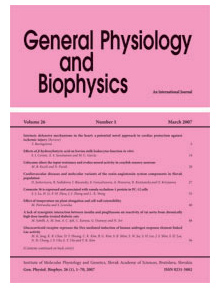General Physiology and Biophysics Vol.38, No.6, p.473–484, 2019
|
| Title: Isorhamnetin induces ROS-dependent cycle arrest at G2/M phase and apoptosis in human hepatocarcinoma Hep3B cells |
| Author: Yung Hyun Choi |
|
Abstract: Isorhamnetin is a 3’-O-methylated metabolite of quercetin that is found predominantly in a variety of medicinal plants. Although many previous studies have reported that this flavonol has diverse health-promoting effects, evidence for the underlying molecular mechanism of anti-cancer efficacy is still lacking. In this study, it was examined the anti-proliferative effect of isorhamnetin on human hepatocarcinoma Hep3B cells, and found that isorhamnetin induced cell cycle arrest at G2/M phase and apoptosis. Isorhamnetin-induced G2/M arrest was associated with decreased expression of proliferating cell nuclear antigen as well as cyclin A and cyclin B1. However, isorhamnetin increased expression of p21WAF1/CIP1, a cyclin-dependent kinase (Cdk) inhibitor, and increased p21 complexed with Cdk2 and Cdc2. In addition, isorhamnetin-induced apoptosis was associated with increased expression of Fas/Fas ligand, reduced ratio of Bcl-2/Bax expression, truncation of Bid, cytosolic release of cytochrome c, and activation of caspase-8, -9 and -3. Isorhamnetin also enhanced intracellular levels of reactive oxygen species (ROS), while the addition of N-acetyl cysteine (NAC), a ROS inhibitor, significantly diminished isorhamnetin-induced mitochondrial dysfunction. Furthermore, the interruption of ROS generation using NAC significantly attenuated isorhamnetin-mediated G2/M arrest and apoptosis. Collectively, this is the first report to show that isorhamnetin inhibited the proliferation of human hepatocarcinoma cells by ROS-dependent arrest of the cell cycle at the G2/M phase and induction of apoptosis.
|
|
| Keywords: Isorhamnetin, Hep3B cells, G2/M arrest, Apoptosis, ROS |
|
|
Published online: 27-Nov-2019
|
| Year: 2019, Volume: 38, Issue: 6 |
Page From: 473, Page To: 484 |
doi:10.4149/gpb_2019038
|
|
 download file download file |
|
|
|
|
 download file
download file
